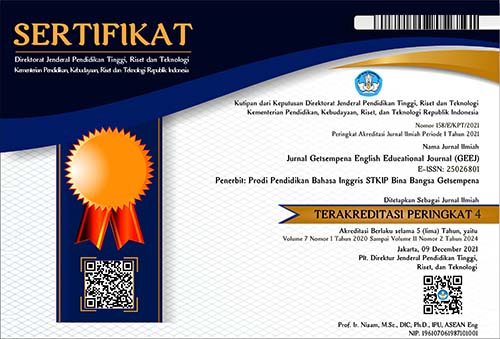EFL STUDENTS ATTITUDES TOWARDS ENGLISH ACADEMIC WRITING
Abstract
Writing has become the most incredible and difficult skills for EFL learners to master relating to generate and organize ideas. This research tried to investigate the importance of writing skill in English Writing subject specifically about students’ responses toward writing difficulties. Thus, the objectives of the study are describing the EFL students’ attitude toward writing, discovering the EFL students’ view of writing difficulties and discovering students’ effort to improve their writing skill. This is a qualitative research conducted through analysis of a questionnaire, interview and students’ written compositions. The survey involved 25 EFL (English as a foreign language) students from the English department of UIN Ar-Raniry who attended Writing class. Data were gathered through questionnaires and one-to-one semi-structured interviews. The results from the questionnaire indicated that the students who have moderate attitude to writing, view writing as difficult, and stressful. Meanwhile, those who have high attitude, mostly suppose writing as interesting and challenging. The result shows that the students encountered numerous difficulties while composing writing: effects of L1 transfer lack of reading, motivation, and practice. Most of the students find it very challenging to obtain sufficient and relevant source information, paraphrase or summarize information, and they are not accustomed to use an English academic writing style. The finding of interview also reveals that several efforts that the students do to improve their writing skill, among others are practice writing with their friend, reading a lot for knowledge and ideas, and composing journal writing. This finding implies that the students should be helped to acquire skills that will enable them to express their ideas clearly and effectively in writing.
References
Al-Gharabally, M. (2015). the Writing Difficulties Faced By L2 Learners and How To Minimize Them. International Journal of English Language and Linguistics Research, 3(5), 42–49. Retrieved from www.eajournals.org
Hyland, K., and Hyland, F. (2003). Interpersonal aspects of response: Constructing and interpreting teacher written feedback. In K. Hyland and F. Hyland (Eds.), Feedback in ESL writing: Contexts and issues (pp. 206–224).Cambridge: Cambridge University Press.
Kellogg, R.T. (1990). Effectiveness of prewriting strategies as a function of task demands. American Journal of Psychology, 103 (3), 327-342.
Larekeng, S. H. (2018). The Asian EFL Journal April 2018, 20(11), 243–249.
Rushidi, J. (2013). Perceptions and Performance: Students’ Attitudes towards Academic English Writing. South East European University Review, 8(2), 1–15. https://doi.org/10.2478/v10306-012-0013-6
Setyowati, L., & Sukmawan, S. (2017). EFL Indonesian Students’ Attitude toward Writing in English. Ssrn, (April). https://doi.org/10.2139/ssrn.2898636
























